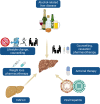Review article: current and emerging therapies for the management of cirrhosis and its complications
- PMID: 35235219
- PMCID: PMC9314053
- DOI: 10.1111/apt.16831
Review article: current and emerging therapies for the management of cirrhosis and its complications
Abstract
Background: Cirrhosis is increasingly common and morbid. Optimal utilisation of therapeutic strategies to prevent and control the complications of cirrhosis are central to improving clinical and patient-reported outcomes.
Methods: We conducted a narrative review of the literature focusing on the most recent advances.
Results: We review the aetiology-focused therapies that can prevent cirrhosis and its complications. These include anti-viral therapies, psychopharmacological therapy for alcohol-use disorder, and the current landscape of clinical trials for non-alcoholic steatohepatitis. We review the current standard of care and latest developments in the management of hepatic encephalopathy (HE), ascites and hepatorenal syndrome. We evaluate the promise and drawbacks of chemopreventative therapies that have been examined in trials and observational studies which may reduce the risk of hepatocellular carcinoma and cirrhosis complications. Finally, we examine the therapies which address the non-pain symptoms of cirrhosis including pruritis, muscle cramps, sexual dysfunction and fatigue.
Conclusion: The improvement of clinical and patient-reported outcomes for patients with cirrhosis is possible by applying evidence-based pharmacotherapeutic approaches to the prevention and treatment of cirrhosis complications.
© 2022 The Authors. Alimentary Pharmacology & Therapeutics published by John Wiley & Sons Ltd.
Figures


Comment in
-
Editorial: percutaneous placement of a permanent tunnelled catheter for patients with non-malignant ascites - is it safe? Authors' reply.Aliment Pharmacol Ther. 2022 Sep;56(5):911. doi: 10.1111/apt.17157. Aliment Pharmacol Ther. 2022. PMID: 35934850 No abstract available.
-
Editorial: Percutaneous placement of a permanent tunnelled catheter for patients with non-malignant ascites-Is it safe?Aliment Pharmacol Ther. 2022 Sep;56(5):909-910. doi: 10.1111/apt.17099. Aliment Pharmacol Ther. 2022. PMID: 35934857 No abstract available.
Similar articles
-
Diagnosis and Management of Cirrhosis and Its Complications: A Review.JAMA. 2023 May 9;329(18):1589-1602. doi: 10.1001/jama.2023.5997. JAMA. 2023. PMID: 37159031 Free PMC article. Review.
-
Cirrhosis and its complications: evidence based treatment.World J Gastroenterol. 2014 May 14;20(18):5442-60. doi: 10.3748/wjg.v20.i18.5442. World J Gastroenterol. 2014. PMID: 24833875 Free PMC article. Review.
-
Outpatient management of cirrhosis: a narrative review.South Med J. 2006 Jun;99(6):600-6. doi: 10.1097/01.smj.0000220889.36995.54. South Med J. 2006. PMID: 16800415 Review.
-
Current and future pharmacological therapies for managing cirrhosis and its complications.World J Gastroenterol. 2019 Feb 28;25(8):888-908. doi: 10.3748/wjg.v25.i8.888. World J Gastroenterol. 2019. PMID: 30833797 Free PMC article. Review.
-
Presentation and complications associated with cirrhosis of the liver.Curr Med Res Opin. 2015 May;31(5):925-37. doi: 10.1185/03007995.2015.1021905. Curr Med Res Opin. 2015. PMID: 25697811 Review.
Cited by
-
The RELAX randomized controlled trial: Stretching versus meditation for nocturnal muscle cramps.Liver Int. 2024 Sep;44(9):2434-2441. doi: 10.1111/liv.16007. Epub 2024 Jun 11. Liver Int. 2024. PMID: 38860445 Clinical Trial.
-
Development of fully automated models for staging liver fibrosis using non-contrast MRI and artificial intelligence: a retrospective multicenter study.EClinicalMedicine. 2024 Oct 17;77:102881. doi: 10.1016/j.eclinm.2024.102881. eCollection 2024 Nov. EClinicalMedicine. 2024. PMID: 39498462 Free PMC article.
-
Specificity Proteins (SP) and Krüppel-like Factors (KLF) in Liver Physiology and Pathology.Int J Mol Sci. 2023 Feb 28;24(5):4682. doi: 10.3390/ijms24054682. Int J Mol Sci. 2023. PMID: 36902112 Free PMC article. Review.
-
Evolution in diagnosis and management of chronic liver diseases.United European Gastroenterol J. 2023 Dec;11(10):945-947. doi: 10.1002/ueg2.12502. Epub 2023 Nov 28. United European Gastroenterol J. 2023. PMID: 38015649 Free PMC article. No abstract available.
-
Effects of social determinants of health on mortality and incident liver-related events and cardiovascular disease in steatotic liver disease.Aliment Pharmacol Ther. 2023 Sep;58(5):537-545. doi: 10.1111/apt.17631. Epub 2023 Jul 3. Aliment Pharmacol Ther. 2023. PMID: 37394976 Free PMC article.
References
-
- Gines P, Quintero E, Arroyo V, et al. Compensated cirrhosis: natural history and prognostic factors. Hepatology. 1987;7:122‐128. - PubMed
-
- Mellinger JL, Shedden K, Winder GS, et al. The high burden of alcoholic cirrhosis in privately insured persons in the United States. Hepatology. 2018;68:872‐882. - PubMed
-
- Asrani SK, Kouznetsova M, Ogola G, et al. Increasing health care burden of chronic liver disease compared with other chronic diseases, 2004‐2013. Gastroenterology. 2018;155:719‐729. e4. - PubMed
-
- van der Meer AJ, Veldt BJ, Feld JJ, et al. Association between sustained virological response and all‐cause mortality among patients with chronic hepatitis C and advanced hepatic fibrosis. JAMA. 2012;308:2584‐2593. - PubMed
Publication types
MeSH terms
Grants and funding
LinkOut - more resources
Full Text Sources
Other Literature Sources
Medical
